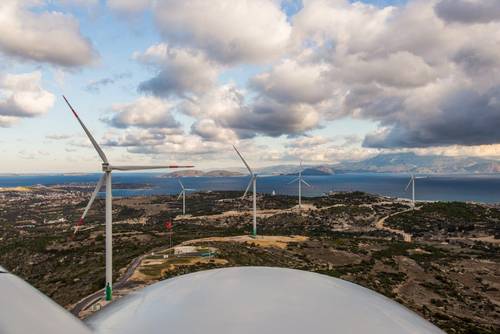Turkey plans to boost its wind power and solar energy capacity by 10,000 megawatts (MW) each over the coming decade through YEKA tenders, Dönmez said.
The share of domestic and renewable energy resources for electricity generation will be more than 50 percent, the minister added.
Dönmez noted at the energy summit that Turkey’s energy sector is experiencing significant changes through privatization and its focus on renewable and domestic production.
He explained that the public sector holds 20 percent of the total installed power capacity and 15 percent of total production, but added that privatization would continue for state-owned small hydroelectric power plants.
The YEKA tenders form part of Turkey’s aim to supply 65 percent of its energy needs from domestic and renewable sources by 2023.
Turkey has focused on increasing the share of local energy resources, such as coal, wind energy, hydroelectricity and geothermal in its energy portfolio applying sustainable and environmentally-friendly production processes.
Turkey’s solar power capacity has reached 6,000 megawatts (MW), Berke Aygün, the head of Solar Energy Investors Association (GÜYAD), has told Anadolu Agency.
Data from the association show that solar power plants generated 9,085 GWh of electricity as of end-November, which already exceeded the total of some 7,800 GWh of power produced at those power plants in the whole of 2018.
Power generation from solar plants accounted for some 3.31 percent of total electricity production, while the sector’s installed capacity corresponded to 6.45 percent of the country’s total 91,375 MW electricity installed capacity as of November.
In November alone, solar power plants generated 580 GWh of electricity. The highest level of electricity production of the country’s power plants was recorded in June, July and August with 1,015, 1,125 and 1,072 GWH, respectively.
Last year, solar power plants provided 2.56 percent of the country’s electricity output. Renewables all together (including geothermal, wind, solar and waste) accounted for 12.73 percent of electricity generation. The shares of geothermal and wind power plants were 2.44 percent and 6.54 percent, respectively.
Some 30.3 percent of electricity was generated from natural gas while hydropower plants’ share was 19.66 percent in 2018.
However, as of November this year, renewables’ share in the country’s total electricity production was higher at 14.47 percent.
Data from GÜYAD also showed that Turkey’s wind power installed capacity was 7,519 MW or 8.23 percent of total electricity installed capacity as of end-November.
The corresponding figures for hydropower and geothermal power plants were 28,494 MW (or 8.23 percent of total) and 1,515 MW (or 1.66 percent), respectively.
“Investments in solar power equipment – even though they have relatively slowed since 2017- reached $5.5 billion to date,” Aygün also said.
The solar power installed capacity will grow by around 700 MW in 2020, he added.
Local producers may fully utilize their capacity to explore export markets if they see opportunities for stable markets but for this to happen, they need to be supported, according to Aygün.
He also noted that players in the industry welcomed the government’s decision to hold “mini” Renewable Energy Resources Zones (YEKA) wind energy tenders in the first quarter of 2020.
“This has given an impetus to the sector. We also demand that the state create 1 gigawatt capacity each year.”
Energy and Natural Resources Minister Fatih Dönmez in October announced the plans for YEKA tenders.


